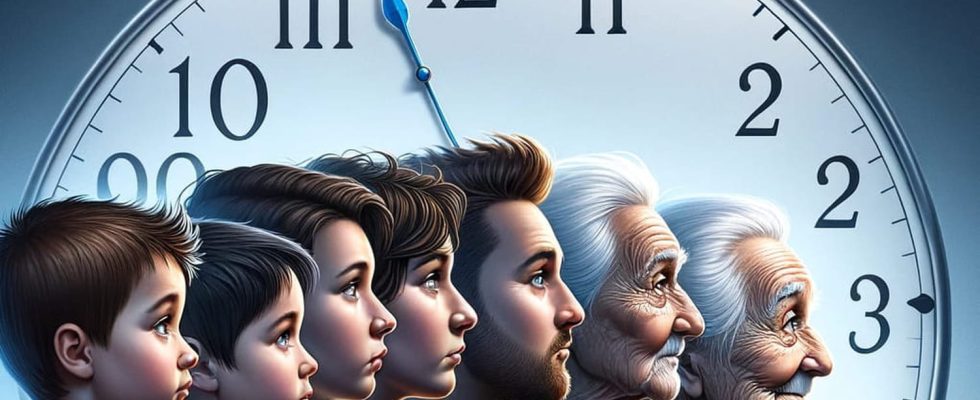The aging of our brain is to blame according to a study, which sets out the keys to slowing down time.
“Already Christmas!, “Already the holidays!”… Let anyone who has never uttered this sentence throw the first stone at us! And for good reason, the older we get, the more our perception of time evolves. So that during childhood, we tend to find the time long, the trend reverses as it grows. But how can we explain this change in perception?
A greater awareness of our finitude
At 6 years old, we impatiently wait for mommy time, Santa Claus, summer vacation… In short, the weeks seem to last months. Then, the years pass, until one day we wonder how time could have passed so quickly. “The older we get, the more we are aware of our finitude and it is precisely this awareness of our finitude that makes us more aware of the passing of time, Johanna Rozenblum, clinical psychologist, immediately asks. Children have the privilege of not being aware of finitude and death, as if they had infinite time ahead of them.” But growing old is also a privilege, according to her. Each year that passes, each birthday that we celebrate, each Christmas is also a way of raising awareness and appreciating this passing time.
To benefit more, it is necessary to register in the present moment
In other words, everything is a question of perception of life and the passage of time. “We can choose to perceive time as time that passes and which brings us closer to the end (pessimistic vision), or we can decide to focus on the privilege of growing old and having to spend years, happy experiences, sometimes more delicate, but in the presence of our loved ones, explains Johanna Rozenblum. To benefit more, it is necessary to register in the present moment because what existed no longer exists and what we have to experience in the future does not yet exist.”
Brain aging modifies the perception of mental images
Several teams of researchers have looked into the question. In study published in 2019 in the European Review, Adrian Bejan, professor of mechanical engineering at Duke University (United States), explains that this feeling is linked to the aging of our brain. According to him, clock time is not the same as time perceived by the human mind because our brains are designed to register changes. “The rate at which changes in mental images are perceived decreases with age due to several physical characteristics that change with age: saccade frequency, body size, airway degradation”, explains the researcher. As children, we absorb so many new images that it feels like the months and years are longer. As an adult and over the years, the brain receives fewer images than what he was trained to do when he was young. So we have the impression that time passes faster.
The key to “slowing down” time?
For Cindy Lustig, professor of psychology at the University of Michigan (United States). the perception of time is also influenced by memory and by what we have experienced. If we’re bored, time seems longer. In question, the lack of exciting experiences which our brain needs to evaluate the passage of time. “As we get older, we tend to have lives more structured around routines, And fewer big events markings that we use to demarcate the different eras of the ‘time of our lives'”, she explains in the scientific media Earth. So for an 80-year-old who does largely the same thing every day, the year will fade into his mind and he will feel like it has passed quickly. The new and exciting things in a day are what make the days and months different and distinguish them in our minds. “For a 5 year old child, a year is 20% of their life filled with experiences to discover the world around him. THE same amount of time represents only 2% of the life of a 50 year old person who probably has fewer new experiences“, illustrates the expert. The key to “slowing down” time? Never stop learning, discovering and creating new memories…
